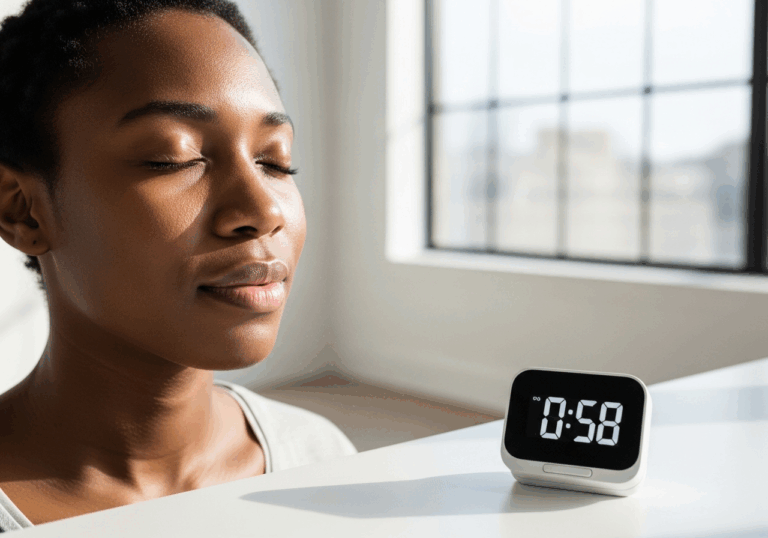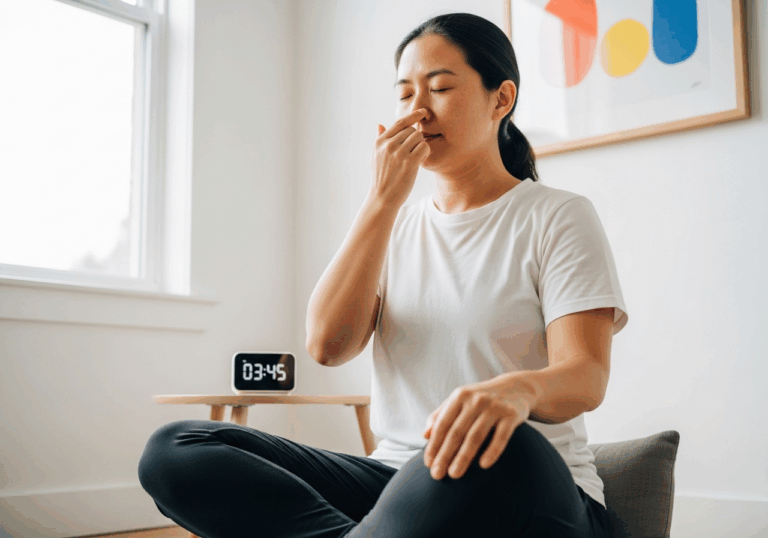Science-Backed Tips
Breathe Better, Live Better
Resonant breathing can lower blood pressure by 9 mmHg.
📊 Did you know?
💡 Why It Matters
1️⃣
Lowering blood pressure can significantly reduce the risk of cardiovascular diseases, which affect 1 in 3 adults.
2️⃣
Effective blood pressure control can improve overall mood and reduce anxiety levels by up to 30%.
3️⃣
Regular practice of resonant breathing may enhance physical comfort, leading to improved quality of life.
✅ Try These Micro-Tips
🎯
Practice resonant breathing for 15 minutes daily to lower blood pressure.
🎯
Inhale and exhale at a rate of 5–6 breaths per minute.
🎯
Incorporate this breathing technique into your morning routine for better stress management.
🎯
Use guided breathing apps to maintain your resonance frequency.
📚 The study
A recent study by Shaffer and Lehrer (2020) highlights the importance of assessing resonance frequency for effective heart rate variability biofeedback.
The research reveals that breathing at an individual’s resonance frequency leads to a remarkable reduction in blood pressure, outperforming fast-paced breathing controls.
This finding is crucial, as managing blood pressure is essential for reducing the risk of cardiovascular diseases, which currently affect one in three adults.
Moreover, effective blood pressure control not only promotes physical comfort but also uplifts mood, potentially decreasing anxiety levels by up to 30%.
By incorporating regular practice of resonant breathing into your daily routine, you can enhance your overall quality of life, experiencing both physical and emotional benefits.
Embrace this simple yet powerful technique to take charge of your health and well-being today!
❓ Frequently Asked Questions ❓
Learn more
What is resonant breathing?
Resonant breathing is a technique that involves inhaling and exhaling at a rate of 5–6 breaths per minute. This practice can help calm the mind and body by reducing cardiovascular arousal.
How does resonant breathing affect blood pressure?
Practicing resonant breathing for 15 minutes can acutely reduce systolic blood pressure by approximately 9/12 mmHg. This reduction is more significant than breathing at a slightly faster rate.
What are the benefits of lowering blood pressure?
Lowering blood pressure can significantly reduce the risk of cardiovascular diseases, which affect 1 in 3 adults. Additionally, effective blood pressure control can enhance overall mood and reduce anxiety levels by up to 30%.
How often should I practice resonant breathing?
It is recommended to practice resonant breathing for 15 minutes daily. Regular practice can enhance physical comfort and improve quality of life.
Can resonant breathing improve my mood?
Yes, resonant breathing can help improve mood by calming the body and reducing anxiety. This technique has been shown to lower cardiovascular arousal, contributing to a more relaxed state.
What is the ideal breathing rate for resonant breathing?
The ideal breathing rate for resonant breathing is 5–6 breaths per minute. This rate is considered optimal for achieving the benefits of reduced blood pressure and improved mood.
How can I incorporate resonant breathing into my routine?
You can incorporate resonant breathing into your morning routine for better stress management. Using guided breathing apps can help you maintain your resonance frequency during practice.
What physiological changes occur during resonant breathing?
During resonant breathing, the body experiences a decrease in cardiovascular arousal, leading to lower blood pressure. This physiological change contributes to enhanced physical comfort and mood.
Is resonant breathing effective for everyone?
While resonant breathing can be beneficial for many individuals, its effectiveness may vary based on personal health conditions. It’s always best to consult with a healthcare professional before starting any new wellness practice.
How long does it take to see results from resonant breathing?
Results from resonant breathing can be observed after just 15 minutes of practice. Regular engagement in this technique can lead to sustained improvements in blood pressure and mood over time.





